Starting a pregnancy journey is a big step. It’s crucial to focus on the health of both mom and baby. Prenatal vitamins are key in this journey. They help the baby grow and support the mom’s health.
Sarah, a first-time mom, learned about prenatal vitamins. She was health-conscious but didn’t know what to do when she got pregnant. Her doctor suggested a good prenatal vitamin. Sarah felt more energetic and her pregnancy went smoothly.
Sarah’s story shows how prenatal vitamins can change a pregnancy. We’ll explore their role and why they’re vital for a healthy pregnancy.
Understanding Prenatal Vitamins and Their Role in Pregnancy
Prenatal vitamins are key for a healthy pregnancy. They give the mother and baby the nutrients they need. Let’s explore what prenatal supplements have and when to start taking them.
Key Components of Prenatal Supplements
Prenatal vitamins have a mix of vitamins and minerals. They are made for expectant mothers. Some important nutrients include:
- Folic acid, which helps prevent neural tube defects
- Iron, to support the increased blood volume during pregnancy
- Calcium, for the development of strong bones and teeth
- Vitamin D, to promote calcium absorption
- Omega-3 fatty acids, such as DHA, to support brain and eye development
When to Start Taking Prenatal Vitamins
It’s best to start prenatal vitamins before pregnancy. This helps your body get ready for a healthy pregnancy. If you’re already pregnant, start taking them too. They help prevent birth defects and support your baby’s growth.
Prescription vs. Over-the-Counter Options
Both prescription and OTC prenatal vitamins work well. Prescription ones have more nutrients. OTC ones are cheaper but make sure they have enough vitamins and minerals. Talk to your doctor to find the right one for you.
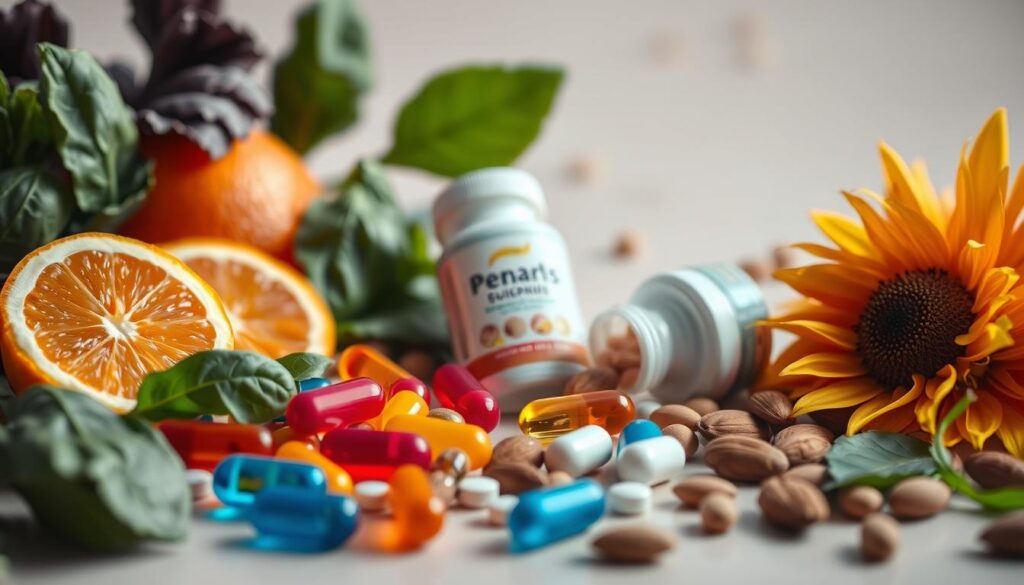
Essential Nutrients Found in Pregnancy Supplements
Choosing the right pregnancy supplements is key for a healthy pregnancy. These prenatal vitamins have important nutrients for both mom and baby. Let’s explore the main parts of good prenatal supplements.
Folic acid, or vitamin B9, is vital in pregnancy supplements. It helps prevent neural tube defects early in pregnancy. It also supports the placenta and cell growth.
Calcium is another must-have in prenatal vitamins. It helps the baby’s bones and teeth grow. It also keeps the mom’s bones strong during pregnancy.
| Nutrient | Importance | Sources |
|---|---|---|
| Iron | Helps prevent anemia and supports the increased blood volume during pregnancy. | Red meat, lentils, spinach, fortified cereals |
| Iodine | Crucial for the proper development of the baby’s brain and nervous system. | Seaweed, dairy products, iodized salt |
| Omega-3 fatty acids (DHA) | Supports the baby’s brain and eye development. | Fatty fish, algae, prenatal supplements |
These nutrients are just a few of the many in top pregnancy supplements. Knowing their importance helps you choose the best for a healthy pregnancy and baby.
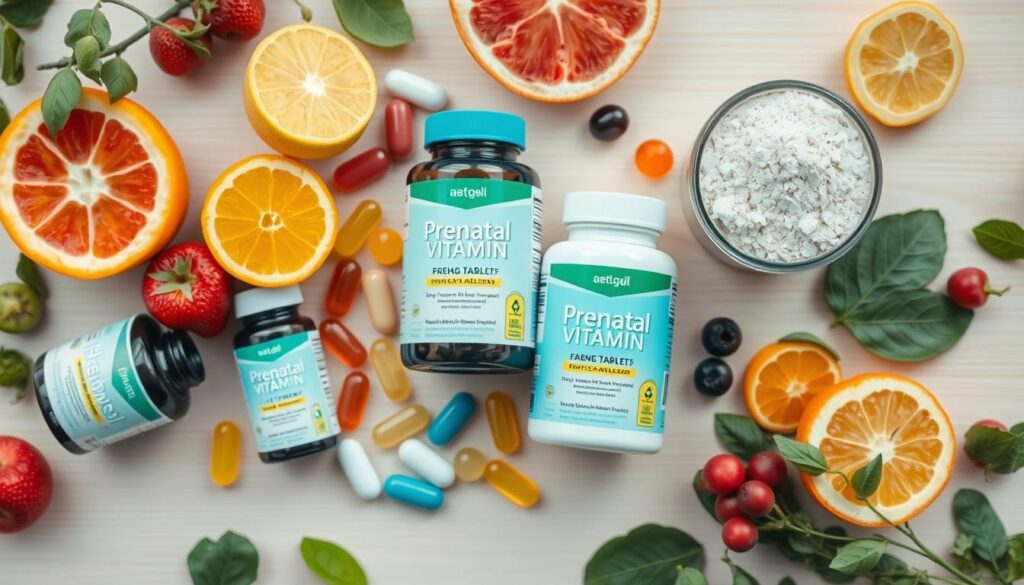
Why Folic Acid is Crucial During Early Pregnancy
Prenatal vitamins are key for a healthy pregnancy. They provide folic acid, which is vital in the early stages. Folic acid helps prevent serious birth defects.
Prevention of Neural Tube Defects
Neural tube defects are serious birth issues. They happen when the brain and spinal cord don’t form right. Taking enough folic acid can lower the risk of these problems.
Recommended Daily Intake Levels
- Pregnant women need 600 micrograms (mcg) or 0.6 milligrams (mg) of folic acid daily.
- Start prenatal vitamins with folic acid before getting pregnant. The neural tube forms early in pregnancy.
Natural Sources of Folic Acid
Food sources of folic acid are important too. They include:
- Leafy green vegetables, such as spinach, kale, and broccoli
- Citrus fruits, like oranges and grapefruit
- Beans, lentils, and peas
- Nuts and seeds
- Whole grains, such as quinoa and brown rice
Eating these foods and taking prenatal vitamins with folic acid helps your baby grow well. It’s crucial for their health in the early stages.
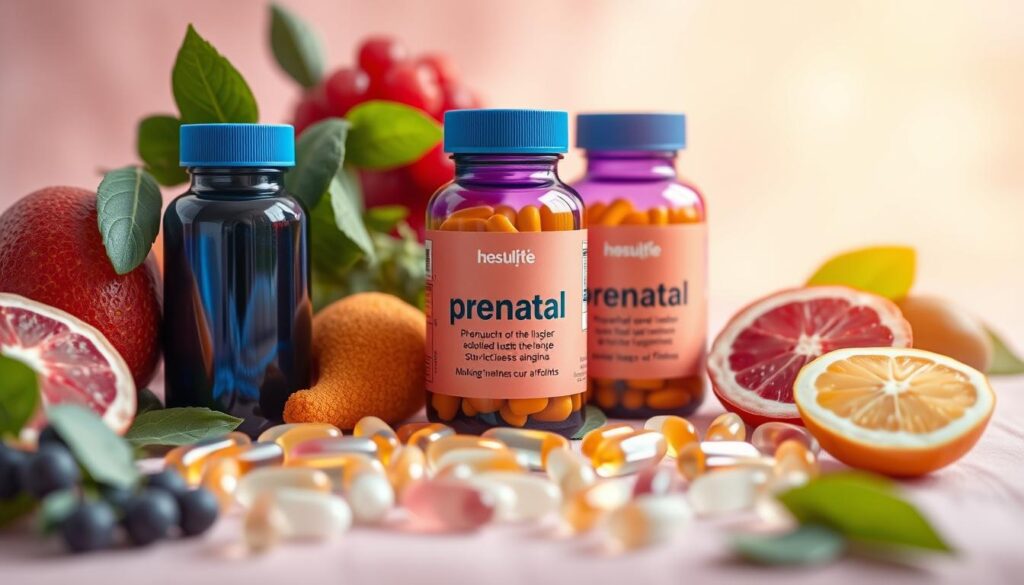
Iron Requirements During Pregnancy
Keeping iron levels up is key during pregnancy. The growing fetus needs more iron for blood and growth. Prenatal vitamins help meet these needs, benefiting both mom and baby.
Pregnant women need 27 milligrams of iron daily, up from 18 milligrams for non-pregnant women. Not getting enough can cause iron deficiency anemia. This can lead to fatigue, weakness, and affect the baby’s growth.
| Iron Requirements | Non-Pregnant Women | Pregnant Women |
|---|---|---|
| Recommended Daily Intake | 18 mg | 27 mg |
Prenatal vitamins are made to give extra iron during pregnancy. Taking these supplements daily helps ensure a healthy pregnancy and baby growth.
“Maintaining optimal iron levels during pregnancy is essential for the well-being of both the mother and the child.”
While prenatal vitamins help with iron, always talk to a healthcare provider. They can suggest the right supplements for your needs.
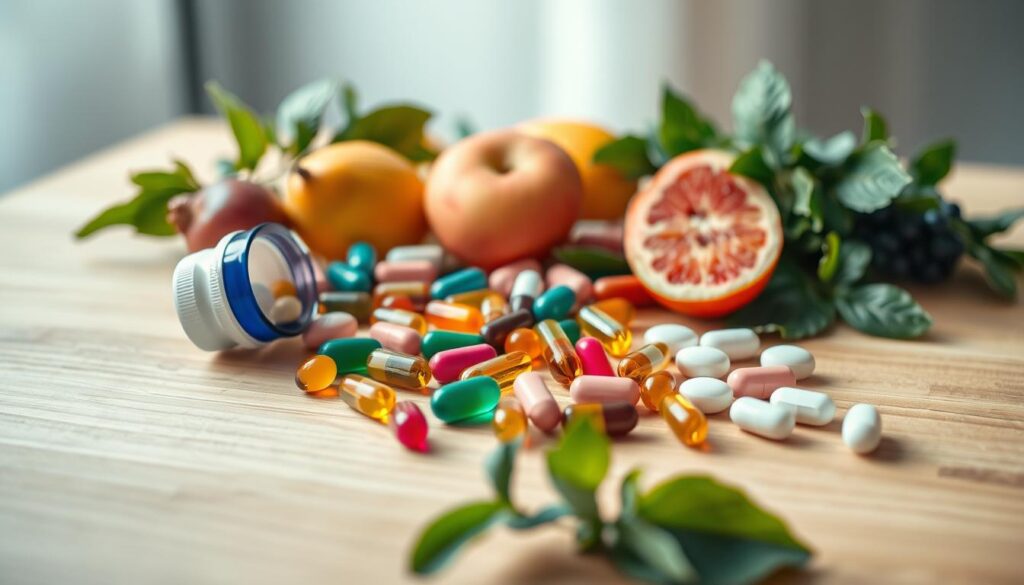
The Benefits of DHA and Omega-3 for Fetal Development
During pregnancy, the right nutrition is key. DHA and omega-3s are crucial for your baby’s brain and thinking skills. Knowing their benefits helps you pick the best prenatal vitamins and foods for your baby.
Brain Development and Cognitive Function
DHA is essential for the brain and nervous system. It supports your baby’s brain, eyes, and thinking abilities. Research shows that enough DHA can boost your child’s IQ, language, and problem-solving skills. Giving your baby enough DHA and omega-3s can help them start strong in school.
Best Sources of DHA During Pregnancy
| Food Source | DHA Content |
|---|---|
| Fatty fish (salmon, tuna, mackerel) | High |
| Algae-based DHA supplements | High |
| Eggs fortified with DHA | Moderate |
| Walnuts and flaxseeds | Low (contain ALA, a precursor to DHA) |
To get enough DHA, eat foods rich in it or take prenatal vitamins with DHA. Talk to your doctor about how much and what kind of supplements you need.
“Adequate DHA intake during pregnancy can positively impact your child’s IQ, language skills, and problem-solving abilities.”
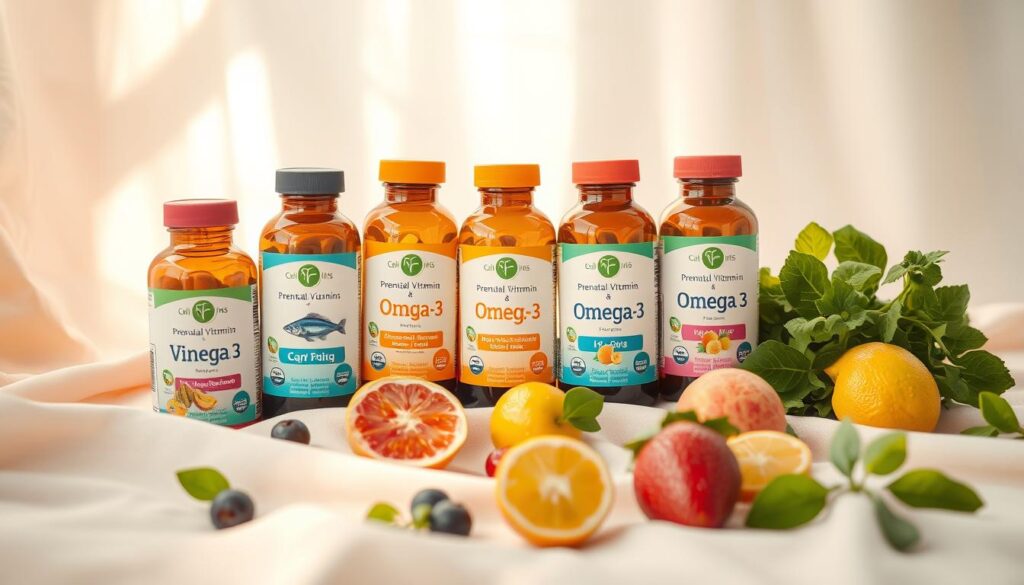
Common Side Effects of Prenatal Vitamins
Prenatal vitamins are key for a healthy pregnancy. But, they can have side effects. Knowing these and how to handle them is important.
Nausea is a common side effect. High levels of iron can upset your stomach. Try taking your vitamin with food or switching brands for a better option.
Constipation is another issue. Iron can slow digestion, causing hard bowel movements. Drinking more water, eating more fiber, and exercising can help.
- Nausea: Take your prenatal vitamin with food, or try a different brand
- Constipation: Stay hydrated, increase fiber, and exercise regularly
- Headaches: Ensure you’re getting enough water and staying well-rested
- Diarrhea: Consult your healthcare provider if this persists
Headaches and diarrhea can also happen. Drinking plenty of water and getting enough sleep can help. If problems don’t go away, talk to your doctor.
Every pregnancy is different. Your body might react differently to prenatal vitamins. Working with your healthcare team can help find the best vitamin for you and your baby.
“Addressing the potential side effects of prenatal vitamins is key to maintaining a healthy pregnancy.”
Choosing the Right Prenatal Vitamins for Your Needs
Choosing the right prenatal vitamins is key during pregnancy. They give you and your baby the nutrients you need. Look for quality, popular brands, and check the labels carefully.
Quality Indicators to Look For
- Third-party testing and certification, such as from USP, NSF, or ConsumerLabs
- Absence of unnecessary fillers, binders, or artificial ingredients
- Appropriate levels of key nutrients like folic acid, iron, and DHA
- Excellent bioavailability to ensure optimal absorption
Popular Brands and Their Features
Some top prenatal vitamin brands include:
- Ritual Essential Prenatal – Vegan, non-GMO, and has methylfolate and methylcobalamin for better absorption.
- Nature Made Prenatal Multi + DHA – Offers 200 mg of DHA and all the essential vitamins and minerals.
- Garden of Life Vitamin Code Prenatal – Uses whole foods and has probiotics for your gut health.
Reading Supplement Labels
When looking at prenatal vitamin labels, focus on these points:
- Serving size and number of servings per container
- Amounts of key nutrients like folic acid, iron, calcium, and DHA
- Third-party certifications or seals of approval
- Presence of any allergens or dietary restrictions
By looking at these factors, you can pick the best prenatal vitamins for a healthy pregnancy.
Combining Prenatal Vitamins with a Healthy Diet
During pregnancy, eating a balanced diet is key. Prenatal vitamins are helpful, but they can’t replace a good diet. Eating well and taking prenatal vitamins helps your body and baby get the nutrients they need.
A healthy diet for pregnancy should include:
- Fruits and vegetables
- Lean proteins like chicken, fish, and eggs
- Whole grains such as brown rice, quinoa, and whole-wheat bread
- Healthy fats from avocados, nuts, and seeds
- Dairy products like low-fat milk, yogurt, and cheese
These foods are packed with vitamins and minerals. They support your baby’s growth and your health. Eating a variety of plant-based foods helps you get the nutrients you need without relying too much on supplements.
| Nutrient | Dietary Sources | Prenatal Vitamin Benefits |
|---|---|---|
| Folic Acid | Leafy greens, citrus fruits, beans | Reduces the risk of neural tube defects |
| Iron | Red meat, poultry, lentils, spinach | Prevents anemia and supports healthy blood production |
| Calcium | Dairy products, leafy greens, fortified foods | Supports bone development and fetal growth |
| DHA | Fatty fish, algae supplements | Promotes brain and eye development in the fetus |
While prenatal vitamins are important, they shouldn’t replace a balanced diet. Combining a healthy diet with prenatal vitamins ensures your body and baby get the best nutrition for a healthy pregnancy.
When to Take Prenatal Vitamins Throughout the Day
It’s important to know when to take your prenatal vitamins. This helps your body absorb them better. It also makes sure your baby gets the nutrients they need.
Optimal Timing for Better Absorption
For the best results, take your prenatal vitamins at the right time. It’s best to take them with a meal. This helps your body absorb the nutrients better.
Some prenatal vitamins work better on an empty stomach. But, others might upset your stomach if not taken with food.
- Take your prenatal vitamins with a meal, preferably one that includes healthy fats and proteins to enhance absorption.
- If your prenatal vitamin contains iron, it’s best to take it with a vitamin C-rich food or beverage to improve iron uptake.
- Avoid taking prenatal vitamins at the same time as calcium or zinc supplements, as they can interfere with the absorption of other nutrients.
Avoiding Interactions with Other Medications
Prenatal vitamins can interact with some medications. Always talk to your healthcare provider before starting them. This is especially true if you’re already taking other drugs.
Some medications that might interact with prenatal vitamins include:
| Medication | Potential Interaction |
|---|---|
| Antacids | Can interfere with the absorption of certain prenatal vitamin components, such as iron and calcium. |
| Blood thinners | May be affected by the vitamin K content in some prenatal vitamins. |
| Thyroid medications | Prenatal vitamins containing iodine can impact the effectiveness of thyroid medications. |
Knowing the best time to take your prenatal vitamins and any potential interactions is key. This ensures your prenatal vitamin regimen is safe and effective. It provides the essential nutrients your body and baby need during pregnancy.
Conclusion
Prenatal vitamins are key for a healthy pregnancy. They provide important nutrients like folic acid and iron. Omega-3s also help in fetal development.
Every woman’s needs are different. So, it’s important to talk to your healthcare provider about the right prenatal vitamins for you. This way, you can support your baby’s growth and have a healthy pregnancy.
While prenatal vitamins are crucial, a balanced diet is the main focus. Whole, nutrient-rich foods should be your base. Adding prenatal vitamins as a supplement can give your baby the best start in life.

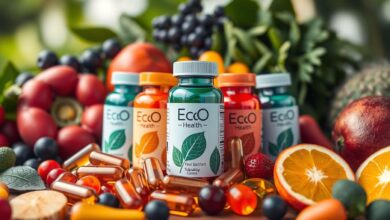



2 Comments